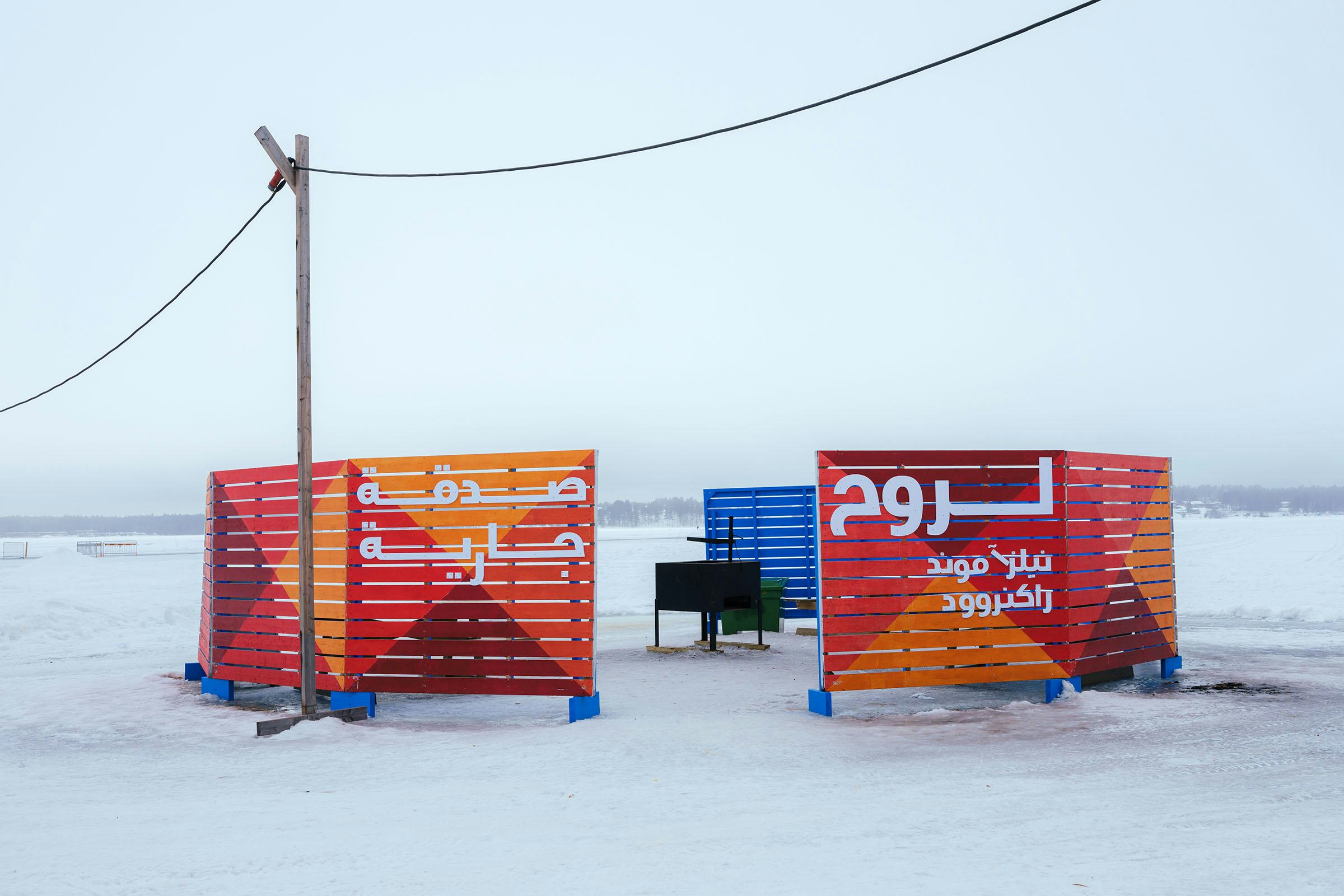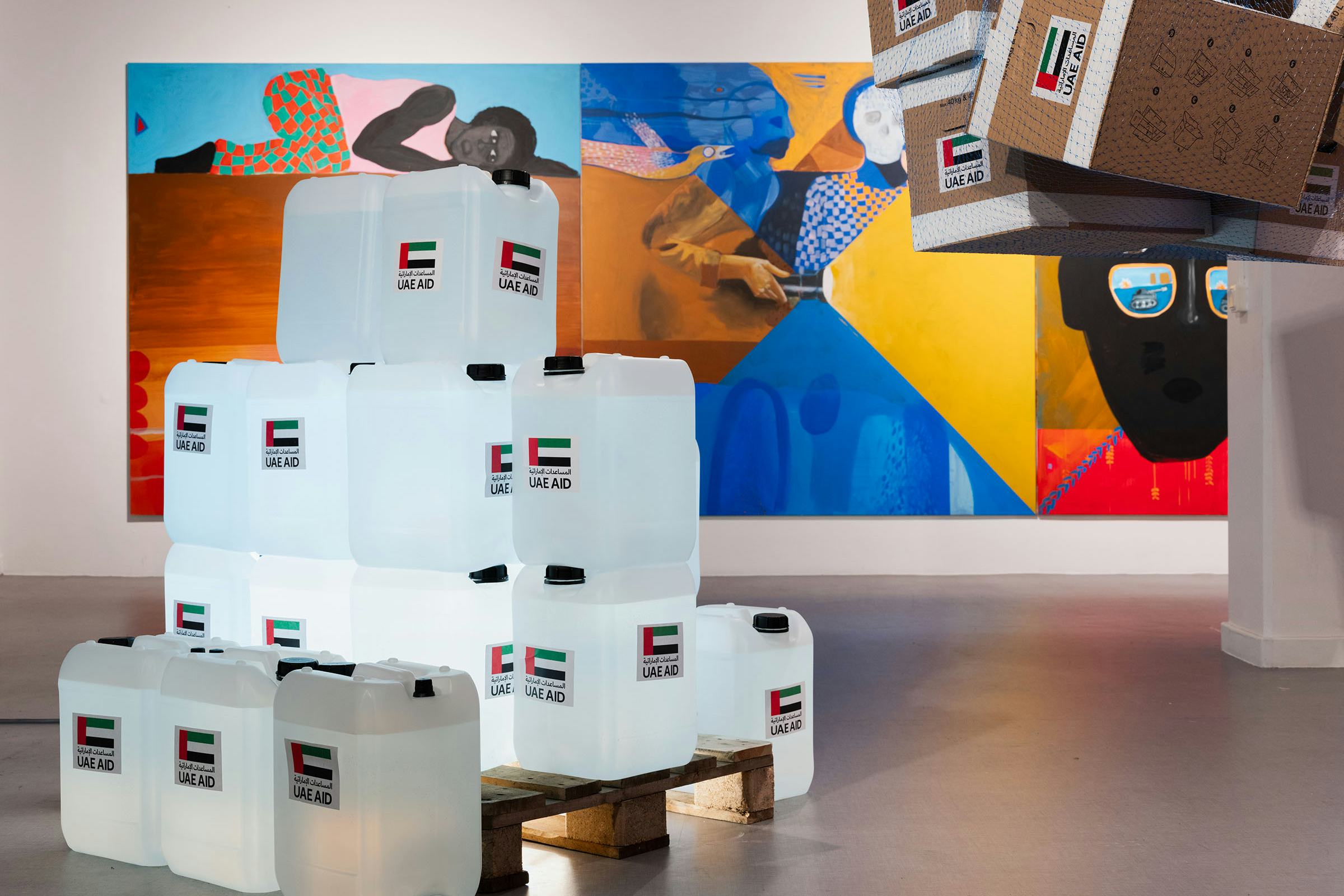LB°24 — Participants
ArchiveThe artist Fadlabi (b. 1975, Omdurman, Sudan) lives and works in Luleå, Sweden.
Fadlabi is influenced by commercial sign paintings in Africa, Ethiopian church paintings and afro-futurism, using various media such as painting, text, sound, video and performance. Through site-specific projects, Fadlabi aims to critically challenge preconceived ideas on identity, race, and power dynamics in History and contemporary life.
On view on Luleå’s Ice Road and Hertsön
Sadaqah Jariyah – On behalf of Nils Amund Raknerud, 2023
Mixed media, variable dimensions.
During the winter of 2023-24, artist Fadlabi transforms Luleå’s Ice Road wind shelters. Using the wind shelters as canvases, he infuses these structures with colours, patterns, and calligraphy inspired by his Sudanese roots and by how its diverse cultural practices express forms of community care, both among the living and in relation to those who have passed. In spring, after the ice has melted, these colourful structures are repurposed and installed in the neighbourhood of Hertsön in Luleå.
With its various ethnic groups, Sudan houses unique cultural practices related to death and mourning. In remembrance of the deceased, Sudanese tradition involves engaging in charitable acts believed to benefit the departed soul. This may include assisting the poor, providing food for those in need, or improving communal public infrastructures such as water supply systems, roads, or sun shelters. A common feature in these projects is the inclusion of the names of the deceased alongside inspirational quotes, serving as a lasting acknowledgment of their memory and as calligraphic ornaments. The Islamic belief in the continuous rewards for those who engage in charitable deeds is expressed by the concept of Sadaqah Jariyah, which carries the idea that positive impacts can extend beyond one's lifetime, benefiting future generations.
Against the backdrop of ongoing wars in Sudan and worldwide, Fadlabi pays homage to those who have passed, simultaneously contributing to the enhancement of a seasonal infrastructure with cultural and recreational significance for Luleå’s community. On the ice, the wind shelters shield people from the cold winds, and in Hertsön, the structures are reconfigured and gain a new purpose, marking the threshold between a civic public space and a construction site. The colourful installation here breathes new life into previously unused spaces, and also brings attention to an area of the city undergoing rapid transformations.
The artist follows the Sudanese economy of means, and dedicates the artwork to his deceased friend and mentor, the Norwegian novelist Nils Amund Raknerud, also extending this homage to all those who find shelter from the wind, both literally and metaphorically. Combining personal reverence with civic care, Fadlabi expands the concept of sheltering beyond physical protection, portraying it as a collective responsibility toward each other and those who are not among us – past and future generations.
Texts in the work and translation
الحب من شيم الكرام
لروح نيلز آموند راكنرود
حباً في الناس و حماية لأجسادهم من الريح
Love is generous
For the soul of Nils Amund Raknerud
For the love of people and to protect their bodies from wind
On view at Galleri Syster, Luleå
Dissecting Love, 2024
Acrylic on canvas.
Commissioned by Luleåbiennalen 2024.
10 Dead Sudanese Men, 2024
Pallet, plastic jug, water, cardboard boxes, plastic, net.
Commissioned by Luleåbiennalen 2024.
In his new paintings, Fadlabi reflects on the ongoing war in his birth country, Sudan. This conflict, involving the Sudanese Armed Forces and the paramilitary Rapid Support Forces, has resulted in the tragic loss of thousands of lives and triggered what the United Nations identifies as the world's largest human displacement crisis.
To grapple with the tragedy and complexity of the war, Fadlabi draws inspiration from the creation of the Sufi movement, which emerged as a spiritual alternative amidst the tragedy of the first civil war in the Islamic community, known as The First Fitna. This series of conflicts and power struggles among early Muslims ultimately lead to the division of the Muslim community into opposing factions. However, a minority disillusioned by the violence chose not to participate in the conflict, instead seeking spiritual guidance. Within this context, Sufism emerged as a mystical and spiritual movement within Islam, emphasising inner purification, and direct personal experience of the Divine. It offered a pathway to transcend sectarian divisions and worldly conflicts by highlighting the interconnectedness of all beings.
While The First Fitna played a significant role in shaping Sufism as a distinct spiritual tradition within Islam, Fadlabi's paintings serve as the artist’s own meditation on the potential for transcendence and unity amid ongoing adversities. While Sufi practitioners sought to deepen their connection with God through practices like meditation and prayer, Fadlabi utilises painting as a medium to grapple with his thoughts and reconsider broader concepts and beliefs.
Fadlabi also presents the work 10 Dead Sudanese Men, an installation that alludes to the boxes containing food and medical supplies provided by humanitarian agencies, NGOs, and others. Symbolically, the installation weighs the average weight of 10 deceased human bodies, through the chemical components found in essential humanitarian provisions. The artist correlates the elemental composition of the human body, including Oxygen, Hydrogen, and Carbon, with basic provision inside the aid boxes, such as water, protein-rich foods, carbohydrates, and dairy products.
The artists added to the boxes logos of an NGO which references the role of the Arab Gulf countries in providing humanitarian assistance and rescue operations. Nevertheless, this logo also carries mixed-feelings about such humanitarian assistance, since there is a pervasive conviction in Sudan that such countries see the ongoing war as an opportunity to solidify their hegemonic status in the Middle East. This would be motivated by strategic interests in Sudan’s abundant natural resources as well as the country's geographical significance as a threshold linking the Middle East and Africa, providing a crucial access point to global trade routes and supply chains through the Bab al-Mandab strait.
Fadlabi studied at The Oslo National Art Academy (KHiO), The Institute of Diplomatic Studies in Sudan, Alneelain University in Sudan and The Sudan University. His works have been presented at the Uppsala Art Museum, SE (2023), the Minnesota Museum of American Art, USA (2019), Performa 15, USA (2015) and Sharjah Biennial 11, UAE (2013). Fadlabi’s works are also part of collections such as the Trondheim Art Museum, The Norwegian National Museum and The Norwegian Parliament. In 2017 he founded Khartoum Contemporary Art Center (KCAC) together with Karin Erixon.
With support from
Office for Contemporary Art Norway (OCA)
The Swedish Arts Council
Galleri Syster

